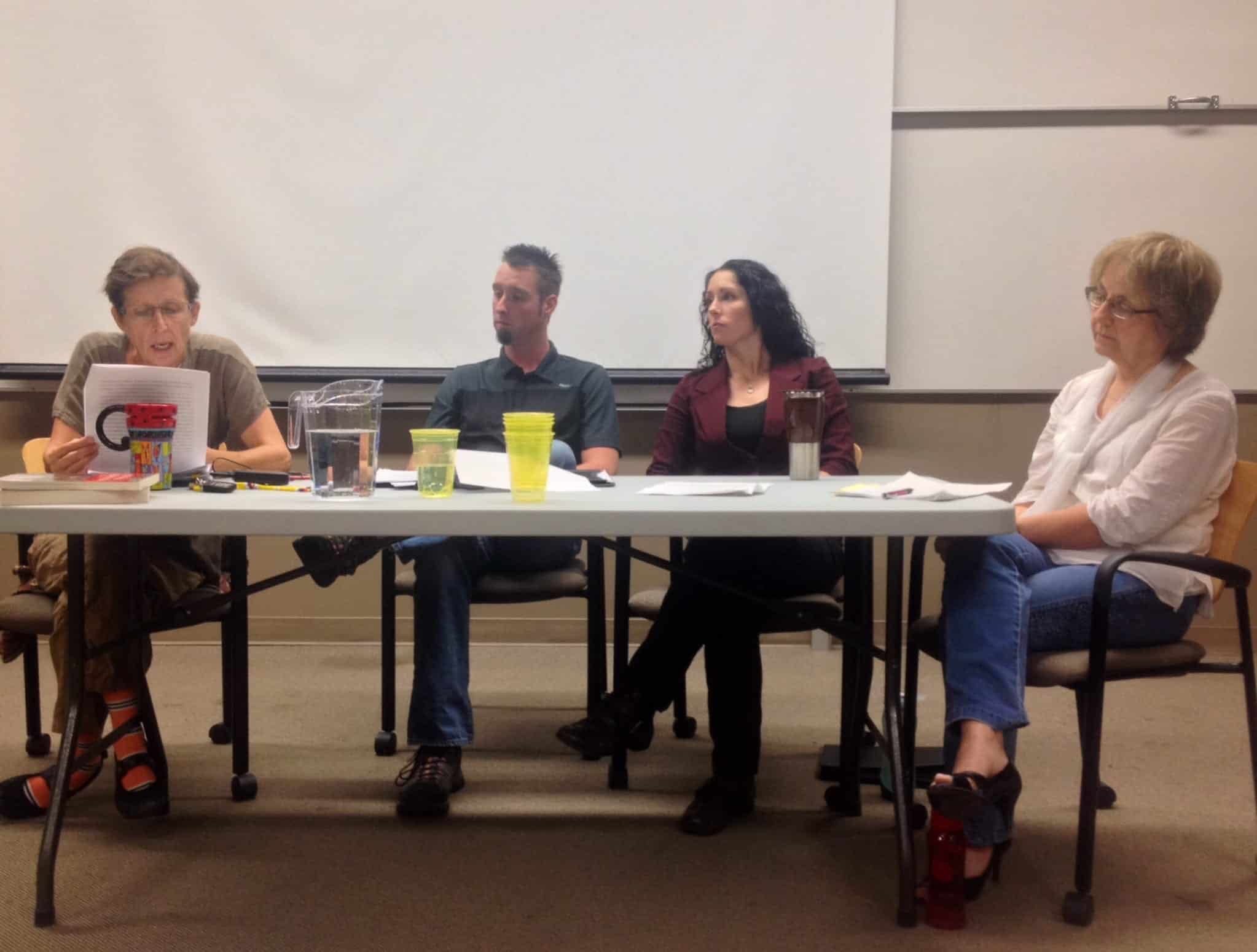
Continued coverage on the polarizing bill
Author: lauren neumann – contributor

Left to right: Darlene Juschka, Const. Josh Potter, Crystal Giesbrecht, Diane Delaney. / Lauren Neumann
Bill C-36 continues to be contested with debates taking place all over Canada this month – from Ottawa to our very own university.
Last Friday, the community research unit, the Provincial Association of Transition Houses and Services of Saskatchewan (PATHS), and the faculty of arts held a round-table discussion at the University of Regina, where the panel explained the implications of Bill C-36 and the controversy surrounding it. The goal of the round-table was to inform students on the bill and for them to see how different members of the community are responding to it.
In brief, Bill C-36 is a proposal to rewrite Canada’s prostitution laws after they were struck down last year. The current laws allow sex to be bought and sold, but with many restrictions. The changes proposed by the Conservative include targeting pimps and johns by making buying and selling sex, as a third party, a criminal offense. Advertising sex from a third party, as well as in public places, will also be illegal.
The bill is scheduled to potentially pass in December of this year. Whether it passes or not, it’s a sure bet that the debate around sex workers’ rights and securities will not die down.
The round-table consisted of three parties whose arguments took vastly different stances on the bill, the sex industry and prostitutes’ rights. On the panel sat Diane Delaney and Crystal Giesbrecht from The Provincial Association of Transition Houses and Services of Saskatchewan (PATHS), Det. Const. Josh Potter of the Regina Police Service, and Darlene Juschka, professor with the women’s and gender studies department and religious studies department at the University of Regina.
Delaney and Giesbrecht of PATHS were firm in their belief that prostitution should never enter the labour market and that sex work cannot be regulated.
“Decriminalizing prostitution would increase the demand for women in prostitution and therefore decrease women’s equality,” said Giesbrecht.
She argued that those who purchase sex for profit off of the avails of workers should be criminalized and those who sell should never be prosecuted – a stance that lines up closely with that of Bill C-36.
She shot down the views of the 10 per cent of sex workers who enter the industry out of personal choice and enjoyment by saying that laws need to be put into place to work for “those who do not have a choice, who cannot advocate for themselves, who face the most violence and who represent the majority of women in prostitution.” She added that they want more meaningful career choices for sex workers and for them to find a way out of the industry.
According to Delaney from PATHS, profit is what drives this dangerous industry.
“Once we are removed from the constraints of capitalism, we are free to make decisions unencumbered by the demands of an inherently oppressive system,” said Delaney, “we no longer have to make choices which are based on maximizing profits. We are free to enact laws which are based, then, on our moral beliefs.”
She acknowledged that the concept of morality does tend towards religious fundamentalism and is unpopular in a progressive society. However, she believes that there is logic to maintaining a moral code in protecting others from harm when humans are fundamentally interdependent and drawn to pleasure.
“Moral codes serve as a framework to keep our pleasure-seeking nature in check. It would be foolish, if not catastrophic to abandon all notions of any kind of moral code,” she said.
Const. Potter spoke on behalf of the police. He described the current laws to be equivalent to a “slap on the wrist,” and that offenders had to go to court six or seven times before punishments became more serious than a fine. According to Potter, there are “two entirely different worlds” when it comes to prostitution.
Prior to the Bedford decision in December 2012 – the reason the laws are now being re-written – Regina police primarily dealt with visible, low-end prostitution that happens at the street level. Since Bedford, gathering intel into high-end prostitution rings has become the main focus for police, as sex-for-hire websites became more widespread. Potter said that the police force was reporting their findings to their chiefs of police, where they then put together a document to inform the government of their stance. The chiefs of police’s position was that “[prostitution] shouldn’t be legalized in any way, shape or form. They wanted to take the law and make it a little more strict,” stated Potter. They rejected the Nordic model, the model that C-36 is trying to implement, in fear that it would bring about more human trafficking in response to increased demand in sex workers. The government’s response was that they wouldn’t make the laws stricter and would rather shift their focus to targeting pimps and johns.
Potter commented, “On a given night, now that there is no enforcement, you go from seeing maybe five or six girls a night to maybe 30. A lot of crime has increased now due to the fact that we’re not out there doing any enforcement anymore.”
Juschka asked the assembly to think about prostitution as sex work, like construction workers or police officers, and to locate sex work within a discourse of labor. Her position was that this allows us to address the stigma associated with this kind of labor.
“To my mind, it is necessary to fully legalize sex work, to use our labour laws to protect those who engage in sex work and to ensure that coercive underage sex work is stopped dead in its tracks,” said Juschka.
She argues that the danger associated with the work is the result of the stigma, rather than the work itself. She opposes the language of victim and victimizer.
“As a feminist, who adheres to a harm-reduction approach in regard to sex work, I cannot endorse Bill C-36, as it continues to stigmatize sex work and sex workers and in the process, disenfranchises them, even as it purports to rescue them.”








